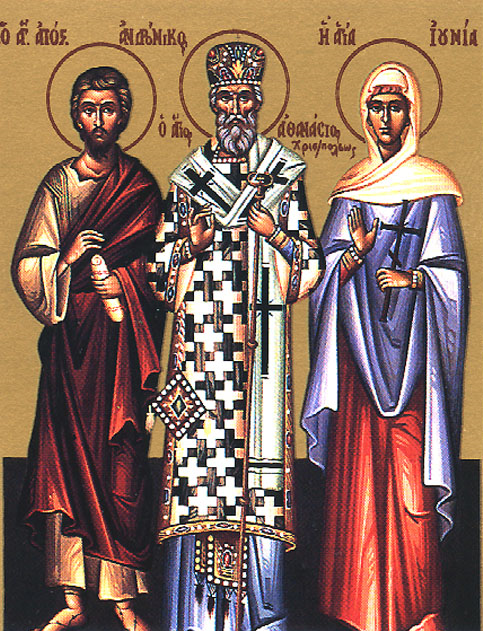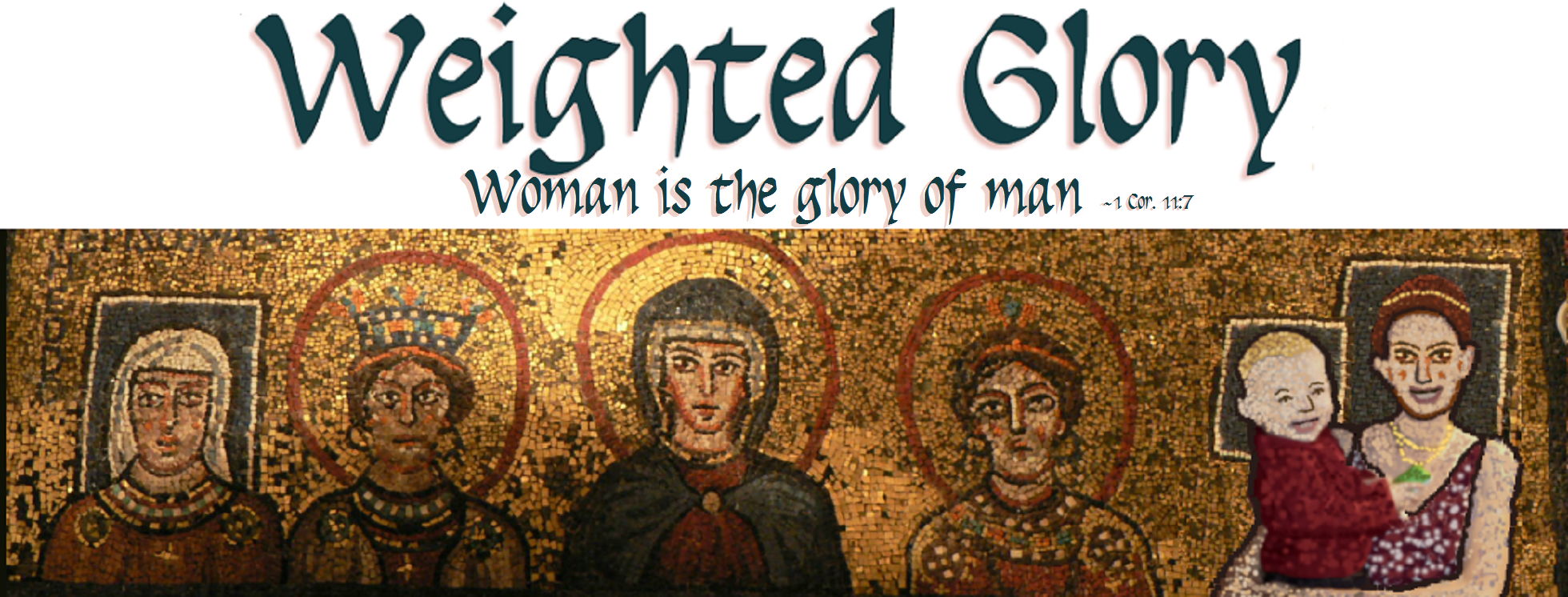
(2022 UPDATE: This 2017 article represents peak pre-doctoral, “sarcasm is my spiritual gift” Bridget. I’m far more polite and charitable about disagreements these days, but I’ve decided to leave this post up. Some people on the Internet still need to hear that the arguments they’re using re: Junia are very, very bad. I also think I have some updates to the material on Ps.-Epiphanius, but I’ll wait until I know for sure to change it.)
—————
There is a female apostle in the Bible named Junia (Romans 16:7): “Greet Andronicus and Junia, my fellow Jews who have been in prison with me. They are outstanding among the apostles, and they were in Christ before I was.” (NIV) Anyone who opposes the ordination of women needs to reconcile their theology of ordination with that fact.
Several early church fathers commented on the passage and confirmed this Scriptural witness to a female apostle:
Origen (AD 184/185 – 253/254): “It is indeed possible that they were Paul’s relatives even according to the flesh and that they believed in Christ before him and were held to be noble among the apostles of Christ. It can also be understood that perhaps they were of the seventy-two, who themselves were also named apostles, and on that account he would call them noble among the apostles, even among those apostles who were before him.” (Commentary on the Epistle to the Romans 10.21.2, as translated into Latin and preserved by Rufinus, translated into English by Thomas Scheck)
John Chrysostom (c. AD 349 – 407): “To be apostles is a great thing, but to be distinguished among them—consider what an extraordinary accolade that is! They were distinguished because of their works and because of their upright deeds. Indeed, how great was the wisdom of this woman that she was thought worthy of being called an apostle!” (In epistulam ad Romanos 31.2; PG:60.669-70, translation mine)
Theodoret of Cyrrhus (c. AD 393 – c. 458/466): “Then to be called ‘of note’ not only among the disciples but also among the teachers, and not just among the teachers but even among the apostles . . . ” (Interpretatio in quatuordecim epistolas S. Pauli 82.200, translated by Linda Belleville)
That alone is enough to establish that the first sentence of this post is a sound translation of Romans 16:7 with the backing of history and tradition.
“But—but—we don’t know that Junia was a woman!”
Yes we do. We have hundreds of examples of women named “Junia” in antiquity. We have not even a single example of a man named “Junias.” [1] Zero. Zip. Zilch. Nada. What other confirmation of her gender are you expecting, a diagram of her junk on the wall of a 1st century bathroom stall scribbled next to, “For a good time, call the apostle Junia”?
If the text of your English Bible even has “Junias” as a footnote, congratulations: your translators are biased and terrible at their jobs.
“But ‘Junias’ could be a nickname for a man named Junius or Junianus!”
No, it could not. We have no examples from antiquity of men named “Junius” or “Junianus” being nicknamed “Junias.” Zero. Zip. Zilch. Nada. Furthermore, the hypocorism for Junianus would be Ἰούνιος/ Ἰούνιον, not Ἰουνιᾶς/Ἰουνιᾶν. [2]
“But—but—Origen said Junia was a man!”
No, Origen did not. Two twelfth century variant readings of Origen’s manuscript (via Rufinus) do indeed have man-Junia (Commentary on Romans, 10.39.45), but the keywords there are twelfth century and variant readings. Earlier, more reliable manuscripts all had the feminine Junia, and in multiple places. An eighth/ninth century commentator, Rabanus Maurus Magnentius aka Hraban of Fulda (c. 776-856), quoted Origen and had Junia as feminine. [3]
“But Epiphanius of Salamis said Junia was a man!”
No, Epiphanius did not. The work in question (Index discipulorum) that makes mention of man-Junia was not attributed to Epiphanius (AD 310 – 403) until the 9th century, and “is unlikely to be a genuine work of the fourth-century bishop of Salamis.” [4] Scholarly consensus holds that it was written by a pseudo-Epiphanius c. 8th century. (2022 UPDATE: I believe I can date this document to the 6th century, and will confirm when I know for sure.) But even so, Ps.-Epiphanius said in the very same passage that Priscilla (Rom. 16:3) was a man. Priscilla is mentioned seven times over the course of the New Testament, always with her husband Aquila, who was specified as her spouse in Acts 18:2. So unless one is also open to the possibility that Priscilla and Aquila represent a biblical example of gay marriage, Ps.-Epiphanius’ testimony is garbage and Junia is still a woman. [5]
In contrast, over twenty commentators from the first ~1100 years of Christian history said Junia was a woman: Origen (mentioned earlier) as translated by Rufinus (AD 345 – 410), John Chrysostom (cited earlier), Ambrosiaster (ca. 375), Jerome (c. 345-419), Theodoret of Cyrrhus (cited earlier), Oecumenius (first half of the sixth century), Ps.-Primasius (died c. 567), John Damascene (c. 675-ca. 749), Claudius of Turin (d. 827), Sedulius-Scotus (fl. 848-858), Rabanus Maurus aka Hraban of Fulda (c. 776 – 856), Haymo of Halberstadt (fl. 840-853), Hatto of Vercelli (10th century), Lanfranc of Bec (c. 1005 – 1089), Bruno of Carthusian (c. 1030 – 1101), Theophylact (fl. 1070 – 1081); Peter Abelard (1079 – 1142), Guillelmus Abbas (1085 – 1147/48), Peter Lombard (c. 1095 – 1169), and Herveus Burgidolensis (late 11th century – 1151). Some used the variant “Julia,” also feminine. [6] And none of them have been shown to have a habit of reading the gender wrong on other biblical figures as with Ps.-Epiphanius.
Outside of Pseudo-Epiphanius (8th/9th century) and the late Origen variant manuscripts (12th century), the earliest example of man-Junia comes from Aegidius of Rome (13th century!). [7] For reasonable people, the debate on Junia’s gender is dead and buried.
“Aw, come on. There has to be some way of giving Junia a penis?”
There isn’t, though the irony of so many people who oppose the transgender movement working overtime to turn a woman into a man is not lost on me. In the meantime, man-Junia remains a “figment of chauvinist imagination.” [8]
“But ἐπίσημοι ἐν τοῖς ἀποστόλοις could be translated ‘esteemed by the apostles’ (exclusive) rather than ‘outstanding among the apostles’ (inclusive)!”
This is theoretically grammatically possible but extremely unlikely. The difficulty with getting this from the Greek was noted in 1904 by William Sanday and Arthur Cayley Headlam, writing that the inclusive translation was “probably correct” because it “is in accordance with the meaning of the words. ἐπίσημος, lit. ‘stamped,’ ‘marked,’ would be used of those who were selected from the Apostolic body as ‘distinguished,’ not of those known to the Apostolic body or looked upon by the Apostles as illustrious; it may be translated ‘those of mark among the Apostles.'” [9]
Nevertheless, this argument has become the refuge of the anti-Junia brigade since Michael Burer and Daniel Wallace published a paper on the matter in 2001. Advocates of this translation endlessly cite the Burer-Wallace paper as if theirs was the final word on the subject. In reality, at least three critiques of the Burer-Wallace paper have been published showing that their thesis was slipshod and based on sparse evidence. [10] In numerous cases, passages which Burer and Wallace insisted on as exclusive were arguably or definitely inclusive. Linda Belleville’s response concluded that “an examination of primary usage in the computer databases of Hellenistic Greek literary works, papyri, inscriptions, and artifacts . . . shows επισημοι εν plus the plural dative bears without exception the inclusive sense ‘notable among’” (emphasis mine). [11] It’s also worth pointing out that the exclusive translation of the passage is unattested in the Church Fathers (who all understood the passage to be inclusive) and only shows up very late in church history; it’s the inclusive translation that has the hefty weight of history and tradition behind it.
There may be a bigger problem for advocates of the “esteemed by the apostles” translation though; they are being (dare I say it?) cock-blocked by none other than man-Junia zirself! If we’re to believe that ἐπίσημοι ἐν τοῖς ἀποστόλοις reads naturally to mean “esteemed by the apostles” and that this translation is even preferable to “outstanding among the apostles,” then where did man-Junia even come from? Certainly not the overpowering weight of the ancient evidence! It’s pretty clear that they read their Bibles and said, “Hmm, women can’t be apostles, so this girlie-sounding name must be a little-known man’s name.” [12] Why didn’t they instead say, “Women can’t be apostles, so this passage must mean ‘esteemed by the apostles’ rather than ‘outstanding among the apostles'”?
They didn’t because that is not how the Greek naturally reads. “Esteemed by the apostles” is a relatively modern innovation on the passage devised by men trying to get around the difficulty of a female apostle.
“But we don’t know what kind of ‘apostle’ Junia was! She might have been the kind of ‘apostle’ that isn’t really a big deal.”
So after all of that kicking and screaming for ways to make “man-Junia” and “not-even-an-apostle-Junia” a thing, we’re supposed to believe that for Paul to designate a woman as an “apostle” is no big deal in the first place?
Yeah right. Clearly neither side believes that. If all English translations of the Bible said, “Junia . . . outstanding among the apostles,” it would be a very big deal. And that is why opponents of women’s ordination are working so hard to keep the myth of man-Junia alive. It’s why they’re creating Bible translations that say Junia was “well-known to the apostles” and refusing to even footnote the inclusive translation that would make Junia an apostle (see the ESV, also known as “the abusive boyfriend of Bible translations”). Because they know that having to acknowledge that there is a woman in Scripture who is called an “apostle” would be absolutely devastating.
To get more to the point though: yes, Paul usually uses the term “apostle” for a broader group than “the Twelve,” and that is only a good thing for those of us who accept the biblical witness of this female apostle. While Paul uses the term to mean “messengers” or “envoys” in two places (2 Cor. 8:23, Php. 2:25), we can rule that out as the meaning of Rom. 16:7 because, as Richard Bauckham explains, “Such people are clearly designated ‘apostles of the churches’ (2 Cor 8:23) and ‘your [i. e., the Philippian Christians’] apostle’ (Phil 2:25). It is hard to see how they could form a known body of people among whom Andronicus and Junia could be said to be outstanding.” [13] Rather, Paul seems to speak of a broader group of apostles that includes Barnabas (1 Cor. 9:6), the “brothers of the Lord” (Gal. 1:19; 1 Cor. 9:5), Silas (1 Th 2:7 cf. 1 Th 1:1), and Apollos (1 Cor 4:9 cf 3:5, 3:22, 4:6) [14]; these may be the apostles Paul means when he says the resurrected Christ appeared to “the Twelve” and then later, “to all the apostles” (1 Cor. 15:5, 7). Paul obviously considered himself an apostle, but is never called one of the “Twelve;” he has not drawn the kind of neat lines between different types of apostles that some would prefer. Given that Andronicus and Junia were Christians before Paul was, it makes sense that they belonged to the group of apostles from 1 Cor. 15:7, who had a special witness of the risen Lord and had been commissioned by him to preach his resurrection. It also makes sense that this was the group of apostles that they had distinguished themselves among.
When Paul says, “God has placed in the church first of all apostles, second prophets, third teachers . . .,” is there any reason to assume he means “apostles” in the sense of the Twelve rather than in the broader sense from 1 Cor 15:7? Is there any reason to think the bigger group of apostles isn’t included when Paul says the household of God is “built on the foundation of the apostles and prophets with Christ Jesus himself as the chief cornerstone” (Eph 2:20)? Or “Christ himself gave the apostles, the prophets, the evangelists, the pastors and teachers” (Eph 4:11)?
So it really doesn’t matter what kind of apostle Junia was. The only types of apostle she could possibly be—whether member of the Twelve or member of the broader group to which Paul himself belonged—are still bad news for the opponents of women’s ordination.
Conclusion
There is a female apostle in the Bible and her name is Junia. Suck it up, buttercup.

About the Author: Bridget Jack Jeffries has a bachelor’s degree in classics from Brigham Young University (long story!) and a master’s degree in American church history from Trinity Evangelical Divinity School. She is a member of the Evangelical Covenant Church. Follow her on Twitter.
Notes:
[1] Peter Lampe, Die Stradtrömischen Christen in den ersten beiden Jahrhunderten (Tubingen: J. C. B. Mohr, 1989): 147; as cited by James Walters, “‘Phoebe’ and ‘Junia(s)’—Rom. 16:1-2, 7,” in Essays on Women in Earliest Christianity, Vol. 1, edited by Carroll D. Osburn (Joplin, Missouri: College Press Publishing, 1993), 186.
[2] Eldon Jay Epp, Junia: The First Woman Apostle (Minneapolis, Minn.: Fortress Press, 2005), 42.
[3] Ibid., 33-34, though Epp lists Rabanus Marcus and Hraban of Fulda as two separate authors, an apparent mistake. Note that the Thomas Scheck translation of Origen that I cited earlier incorrectly prefers “Junias.”
[4] See Richard Bauckham, Gospel Women: Studies of the Named Women in the Gospels (Grand Rapids, Mich.: Eerdmans, 2002), 166n242ff.
[5] John Piper and Wayne Grudem, “An Overview of Central Concerns,” in Recovering Biblical Manhood and Womanhood, edited by John Piper and Wayne Grudem (Wheaton, Ill.: Crossway, 1991), 72-73, 84n19.
[6] Lists of commentators who took Junia to be feminine were compiled by Joseph A. Fitzmeyer and Linda Belleville and cited by Epp in Junia, p. 32. I have arranged them in loosely chronological order. This post had previously listed both Ambrose and Ambrosiaster (as does Epp), but only Ambrosiaster commented on Junia (as Julia). The confusion is due to the fact that the Patrologia Latina gives Ambrose as the author of the commentary on Romans when we know now that it was ps-Ambrose, better known as Ambrosiaster.
[7] Walters, 186n56
[8] Robert Jewett, Romans: A Commentary (Minneapolis, Minn.: Fortress Press, 2007), 962.
[9] William Sanday and Arthur C. Headlam, A Critical and Exegetical Commentary on the Epistle to the Romans, 9th Edition (New York: Charles Scribner’s Sons, 1904), 423.
[10] For the paper by Michael H. Burer and Daniel B. Wallace, see “Was Junia Really an Apostle?: A Reexaminationof Rom 16.7,” New Testament Studies 47 (2001): 76-91. For the critiques of their paper, see Bauckham, 165-80; Epp, 72-80; and Linda Belleville, “‘Ιουνίαν . . . ἐπίσημοι ἐν τοῖς ἀποστόλοις: A Re-examination of Romans 16.7 in Light of Primary Source Material,” New Testament Studies 51 (2005): 231-49. In 2015, Burer alone published a response: Michael H. Burer, “ἐπίσημοι ἐν τοῖς ἀποστόλοις in Rom 16:7 as ‘Well Known to the Apostles’: Further Defense and New Evidence,” Journal of the Evangelical Theological Society 58.4 (2015): 731-55. Of the 36 “new” texts which he says “parallel Rom 16:7 exactly in grammatical structure” (731), only 11 even have the construction of ἐπίσημος ἐν + dative (!). Of these, three are from the 5th century, two are from the 4th century, and six are listed as “date varies.” I’ve evaluated the article and most of them are definitely or arguably inclusive; 1-3 I am still investigating. In the meantime, it’s difficult to see how these late examples are supposed to overpower the plethora of evidence pointing to the inclusive sense for ἐπίσημος ἐν + dative in the first century AD.
[11] From the citation summary for Belleville’s paper.
[12] Sanday and Headlam are actually good examples of this, insisting that Junia is probably masculine because a female apostle is unlikely, though they at least had the integrity to note that John Chrysostom had no problem with a female apostle. See Epistle to the Romans, 422-23.
[13] Bauckham, 180.
[14] Here I am paraphrasing Bauckham’s list on p. 180.




Junia’s power is such that misogynists spend their time trying to make her a man or less than an apostle or just not worth acknowledgeing. The simplest solution would be to just admit the truth but that leaves the patriarchy powerless to block women from ordination. Thank you for your thorough and lively refutation.
Thanks Martha. And thanks for commenting on and supporting my articles. <3
Absolutely brilliant. Well written. Love the flow of logic. I am referencing this, if I may?
Thank you! And please, share/reference wherever you like.
Best treatment I’ve read on this issue to date, Bridget. Nonetheless, I believe you should specifically address Euripides Hippolytus, line 103, describing a goddess as σεμνή γε μέντοι κἀπίσημος ἐν βροτοῖς. I believe this inescapably establishes the possibility of the exclusive understanding of ἐπίσημος ἐν + dative plural/ In my opinion it’s less likely but we need to be honest in conceding the possibility.
Timothy ~ Thanks! When I wrote this I decided I wasn’t going to go very in-depth into the arguments concerning ἐπίσημοι ἐν τοῖς ἀποστόλοις because these arguments are very technical and difficult for non-Greek-readers to follow, and I wanted this article to hit on all of the main arguments surrounding Junia as fast as possible.
I may do a more in-depth article addressing the Greek arguments surrounding ἐπίσημοι ἐν τοῖς ἀποστόλοις in the future.
On the surface, note that I did say the exclusive reading is “theoretically grammatically possible but extremely unlikely;” I don’t rule it out 100%. Note also that Hippolytus was written about 483 years before Paul penned Romans. A LOT can change about language in that time. It’s been a while since I read all of the exchanges on Romans 16:7 in full, but IIRC, Belleville located numerous inclusive examples of ἐπίσημος ἐν + dative that were much closer to the writing of Romans than Hippolytus, including Additions to Esther (3rd century BCE and part of the LXX), Josephus (a contemporary of Paul), and two examples in Lucian’s works (2nd century CE).
i have a lot of subjects where I would rather write primary articles on re: women and the Bible before I write a secondary article on Junia though (see my God’s Word to Women tab at the top), so it could be a while.
Thanks for your response.
Can you give me a link to Belleville? When I search for ἐπίσημος in LXX in my Logos software all I get in Esther are 5:4 and E:22, neither of which use it in this construction. I’d like to track down all of these examples.
I’m not actually from Missouri, but I have to see things for myself.
Thanks!
Oops! Found what I needed. Sorry to bug you for it!
Loved the post (especially as a Junia fan) – thank you. Really appreciated seeing all the arguments and responses all laid out in one place. Very engaging too.
Thank you. 🙂
I’ve made a few updates to this post:
(1) In 2015, Michael Burer published a response to the criticisms of his and Wallace’s 2001 paper. I’ve updated what is now fn#10 to reflect this. I plan to respond further, and might publish something more substantive if no one else has anything in the pipeline.
(2) I corrected an error on my list of church fathers who gave Junia as feminine, deleting Ambrose. It seems only Ambrosiaster commented on the matter.
(3) It turns out that Epiphanius of Salamis probably didn’t say Junia was a man (!). I missed Bauckham’s footnote on the matter stating that Index discipulorum wasn’t attributed to Epiphanius until the 9th century and probably isn’t genuine. Most commentaries on the matter just assume/assert that ID is genuine to Epiphanius (as did I), including the egalitarian ones. We’ve all really got to stop doing that. I’d like to do a little more research on this matter and locate the Greek text of this work.